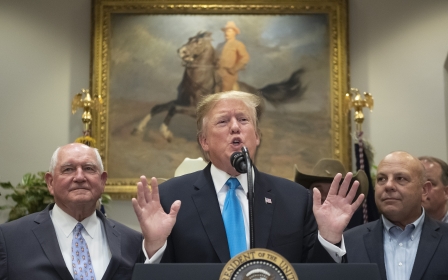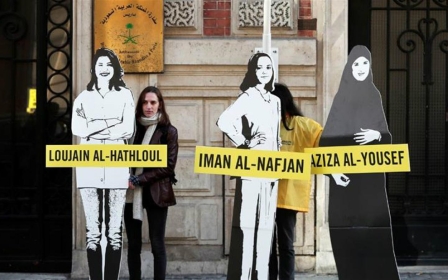Theresa May: What is her legacy for the Middle East and its people?

With Theresa May announcing her intention to resign as prime minister, the impact of her tenure on Britain's relationship with the Middle East is likely to be largely overlooked, particularly considering her government's all-consuming focus on leaving the European Union.
The Conservative leader has maintained her country's traditional strong relations with its allies in the region.
Despite maintaining the status quo, or perhaps because she's maintained the status quo, May has come into criticism for her policies in the region and at home.
Maintaining support for Saudi Arabia
During her tenure, which began in July 2016, the Saudi Arabia-led war in Yemen spiralled into the world's worst humanitarian disaster, with tens of thousands of people thought to have been killed and millions facing starvation.
Stay informed with MEE's newsletters
Sign up to get the latest alerts, insights and analysis, starting with Turkey Unpacked
As the death toll increased, opposition to the UK's involvement in the war steadily grew as well, with repeated calls for the end of - and legal challenges to - the government's supply of weapons, equipment and expertise to the Saudi-led coalition.
Despite this, May's administration repeatedly ruled this out and actively prevented attempts to block arms sales. As recently as Friday, the day the prime minister announced her resignation, it was revealed that the UK had lobbied for an exemption to a German ban on sales to the country.
"Theresa May's most significant policy as PM? Her leading role in sustaining the Saudi war effort in Yemen," David Wearing, a teaching fellow in International Relations at Royal Holloway, wrote on Twitter following the announcement of her resignation.
"Thousands have died - disproportionately small children - who might otherwise have lived, were it not for the May government."
In addition, Britain remained one of the few (still) EU members to maintain good relations with Turkey, agreeing on a £100m defence deal to develop fighter jets in 2017.
In 2016, May was the first UK prime minister and first female politician to attend a meeting of the Gulf Cooperation Council in Manama, Bahrain's capital, where she reportedly sought to pursue $30bn worth of "opportunities" for business in post-Brexit Britain.
Both cases earned her the ire of human rights campaigners, who criticised her for not raising Turkey's invasion of northern Syria and its mass arrests of journalists and opposition politicians, nor the suppression of opposition politicians and human rights activists in Bahrain.
Hostile environment in the UK
May's domestic policies in the UK have also been highly controversial, and have had adverse effects on members of the Middle Eastern diaspora.
Beginning as home secretary under former prime minister David Cameron, May oversaw the hugely controversial "hostile environment" policy for immigrants and refugees.
The phrase stemmed from 2012, when she first pledged to "create, here in Britain, a really hostile environment for illegal immigrants".
During her time in office, she repeatedly attempted, and failed, to achieve a dramatic fall in net immigration to the UK. Among the tactics used was a campaign of sending vehicles into areas with high immigration with the the words "go home or face arrest" on them.
Data published by the Home Office in November 2018 revealed that thousands of LGBT asylum seekers had their asylum requests rejected, including large numbers from Middle Eastern countries.
It showed that out of 309 asylum applications made by people from Iran - a country where homosexuality is punishable by death - between 2015 and 2017, almost half (127) were initially rejected.
Out of 80 applications made by people from Iraq, which does not officially criminalise homosexuality but where LGBT people face severe threats, the majority (54) were rejected.
The process for LGBT asylum seekers in the UK has been condemned as "humiliating" by rights groups, who also accused the government of "setting the bar too high".
Asylum seekers reported having to provide pictures of them engaging in sexual acts with their partners, and of having their applications denied for having children.
Successor?
With May on her way out, all eyes will be on her successor - so far, more than a dozen Conservative politicians have been tipped as a potential replacement.
The current frontrunner is generally thought to be former foreign secretary Boris Johnson, whose reputation was severely tarnished by his handling of the case of Nazanin Zaghari-Ratcliffe, a British-Iranian mother imprisoned by Tehran.
Although the coming weeks and months will be an exciting period for British politics watchers, there is little expectation that a successor to May within the Conservative Party will provide any dramatic change as far as the Middle East is concerned.
However, with the drums of war beating again as US President Donald Trump ratchets up tensions with Iran, there is every possibility that the Middle East will again be the focus of the world's attention.
At that time, Theresa May could be happy to be out of the game.
Middle East Eye delivers independent and unrivalled coverage and analysis of the Middle East, North Africa and beyond. To learn more about republishing this content and the associated fees, please fill out this form. More about MEE can be found here.





